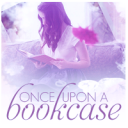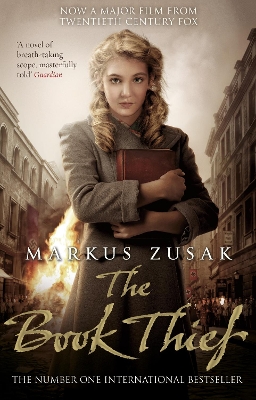
'Life affirming, triumphant and tragic . . . masterfully told. . . but also a wonderful page-turner' Guardian
'Brilliant and hugely ambitious' New York Times
'Extraordinary' Telegraph
___
HERE IS A SMALL FACT - YOU ARE GOING TO DIE
1939. Nazi Germany. The country is holding its breath. Death has never been busier.
Liesel, a nine-year-old girl, is living with a foster family on Himmel Street. Her parents have been taken away to a concentration camp. Liesel steals books. This is her story and the story of the inhabitants of her street when the bombs begin to fall.
SOME IMPORTANT INFORMATION - THIS NOVEL IS NARRATED BY DEATH
___
Over 16 million copies sold worldwide.
Now a major motion picture.
- ISBN10 0552779733
- ISBN13 9780552779739
- Publish Date 30 January 2014 (first published 14 March 2006)
- Publish Status Active
- Publish Country GB
- Publisher Transworld Publishers Ltd
- Imprint Black Swan
- Edition Media tie-in
- Format Paperback (B-Format (198x129 mm))
- Pages 560
- Language English
Reviews

Written on Jul 9, 2020

clementine
Written on May 22, 2019
Well, no, I definitely didn't. The narrative framing was not quite as seamless, and I couldn't help but feel that some of the emotion comes simply out of obligation. Who wouldn't cry at a book about the Holocaust, the devastation of war, the traumas children must bear? It's not that the emotion isn't real, it's that it felt, at times, forced out of me.
There is lots to enjoy here, though. The tenderness of the relationships between Liesel and her foster parents, Liesel and Rudy, Liesel and Max, is genuinely touching. Liesel herself is a great character: damaged and vulnerable but with such a delightful spark. The depiction of childhood feels natural and authentic. The idea of books as unifiers has, of course, been done (meta-literature reinforcing the importance of literature is surely a self-serving theme many have explored), but it has a special significance in the context of Nazi Germany, and especially in the life of a young girl with few means. The everydayness of the characters is a huge strength of the novel: these characters live in Germany, which we know to be "the bad side", but they are just capable of kindness and empathy as everyone else. The war devastates everyone, forcing them to make terrible decisions, to do the best with what they have. Part of me wished that this novel had been slightly less apolitical (for example, the Hubermanns taking in Max is framed as simply an accident rather than a decision borne of a developed political consciousness), but I guess it's not that sort of story. I just have a fierce desire for literature that takes a strong political stand, especially in this nightmarish day and age.
So - I still like this book, but at nearly twenty-five I'm more clearly able to see its pretensions and considerable triteness even while enjoying certain aspects of it. It's hard for me to rate it accurately because I do have such an attachment to it from several teenage years in which I referred to it as my favourite book.

gmcgregor
Written on Oct 30, 2017
Death is our narrator, and when the illiterate Liesel snatches a book off the ground as her brother is buried, he (it?) dubs her "the book thief". Liesel doesn't actually steal very many books during the course of the story, but it fits well enough. For a while, as Liesel grows to know and love her rough-edged, foul-mouthed foster mother and gentle, patient foster father who teaches her to read, and makes friends with her neighbor Rudy, their little town is isolated from larger events. But the real world can't be avoided forever, and World War II sweeps over the Hubermann household, bringing a Jewish man into their basement to hide and constant danger lurking everywhere.
The villagers' attitudes toward Nazism range from passionate true believers to the Hubermanns, who resist joining the Party and hide a Jew for months. Many of their neighbors go along as far as they need to to keep out of trouble. I don't think this is a perspective we see very often, looking at the ordinary people who exist in these regimes, and so I found it interesting to read. Zusak's characterizations of everyone who populates the village are a highlight...Liesel herself is probably the least well-developed character, but Hans, Rosa, Rudy, and several of Liesel's other classmates make vivid impressions and linger in the memory even after the book is closed.
But even though this book tends to get rapturous praise, there were some places where it fell flat, too. I think the Death-as-narrator trick worked less well than it could have...it just struck me as more gimmicky than meaningful and never really developed. I think the constant interjections into the text as "explainers" by Death were overused, and I think Zusak's writing is sometimes overly focused on going for "wow" instead of letting itself flow. As a whole, though, these are minor quibbles. The book is very good, with vivid and developed characters living in a well-drawn community, and the ending has a big (and earned!) emotional impact. It's well-worth reading and I'd recommend it widely, to everyone.

thepunktheory
Written on Jun 18, 2017
When I picked up this book , I had no idea what to expect. The first surprise was the unexpected narrator. The Book Thief is told from the perspective of death himself, who always keeps an eye on little Liesel. You can already tell, this is not an ordinary novel.
To be more precise, it's the kid of book that rips your heart out and then tears it to shreds. The story Markus Zusak crafted is insanely intense and touching. I hadn't expected this novel to hit me this heart, but I was moved to tears several times. Every little details comes together perfectly in this more than heartbreaking plot.
Despite all the tragic you will find, there are still moments that will bring a smile to your face, which makes the rest even sadder.

Jo
Written on Apr 19, 2017
I've owned The Book Thief by Markus Zusak for years. Although it didn't sound like my kind of book - I'm not a fan of historical novels in general, and things set during the World Wars tend not to be my bag - I bought it because of how hyped it was. Everyone I've spoken to who has read this book has loved it. That's hard to ignore. The movie was on TV over the Easter weekend, and as I wanted to read the book before seeing the movie, I thought it was about time I picked it up. Did I enjoy it? Yes. Did I think it was amazing? I'm not so sure. I'm still trying to figure that out, as it didn't hit me as hard as I expected it, too.
I loved that Death was the narrator. I found his voice fascinating. He wasn't at all like I expected him to be; he cared a lot more than I thought, and hated his job. It affects him, the things he sees, the people he must take away - children, babies, the innocent people who are the casualties of war. I know it would have made for a terribly upsetting book, but part of me wishes Death was telling us his own story, rather than Liesel's.
But Death is telling us Liesel's story because it's his distraction. When you're Death, you can't take a break or a holiday, you're constantly working. So he distracts himself instead, by noticing the beauty in the colours around him as he collects souls, and in the stories of people. And in this case, it's Liesel's. We know from the beginning that he finds her book, the book she wrote of the story of her life in Molching on the outskirts of Munich, and he is telling us her story. He's not reading us the book, he is telling us it as he remembers it, after reading it countless times, with his own additions; things he knows or has learnt from being around for eternity that add insight to Liesel's story, or moments in her story where he was present, telling us those parts from his perspective. He also has his little interjections in the narration where he pauses to emphasise something in particular; the contents of a letter, quotes from a book, a conversation, and so on. The way he tells it is just so interesting, and it's also kind of cool to have such an older, experienced, world-weary voice telling a child/teenager's story. And he cares, you know? Most of the time, it just feels like a third person narration, but he will give his thoughts, too, and he cares about what happens to Liesel and what she experiences.
But, although I loved Death's narration, I did find myself emotionally detached from Liesel's story for most of the book. I enjoyed it, and I would be affected by things that happened, but in distant, vague way. It was like watching the news, and being really upset by the terrible things that were happening to people on the other side of the world, but not how I would feel if it happened to someone I knew. It's a different sort of sadness. And yes, I do cry sometimes when I watch the news, and I cried when reading the book, but I just wasn't as upset as I would have expected to be had I known how the story would go before I opened it's pages. I think the things I loved about Death himself were the things that stopped me from getting as emotionally involved in Liesel's story as I would have liked; his older, world-weary voice, his knowing. I didn't feel Liesel's pain, I was told about it - that's kind of how it felt, even though I could see everything that happened to Liesel like I would in a normal third person narration. I just couldn't feel it as acutely.
Saying, that, though, when Death would pause and tell us what was happening with the WWII in other parts of Germany or Russia, that's when I felt it. Death was then telling us about what he saw, what he felt, and that really affected me. Those moments when he's on a battlefield collecting souls, seeing the bodies, watching those who are not quite yet dead. Those moments were horrific. They were small moments, only a few pages each, but they shook me. More so because Death, Death, was affected, too. Death does not like his job, and he's busier than usual during war, and all the things he sees. It's too much. You do feel sorry for Death, because he has no escape; he is the only one who can collect these souls, and they need collecting. It's just all so terrible.
And this may sound ridiculous, but when it comes to WWII, I've never really thought about the German civilians. At school, you only ever hear about what Hitler and the Nazi's did to others, or their own Jewish people. You don't really hear about what the Allies do to Germany. And through Liesel's story, you see that not everyone supports Hitler - in fact, there were those who hated him - but dictator that he was, they had to act like they did, or face the consequences. They're just normal, innocent, everyday people, trying to get by in a country ruled by a tyrant. And because of him, and how he needed to be stopped, these everyday people suffer, just like those Hitler attacked. Being from the UK, it was difficult to have that realisation. We did that. Hitler was a disgusting, abominable man, yes, but we killed innocent German people, too. As Death says, they were murdered. And considering what's going on in the world today, this was a bit of an eye-opener. It left me with a very heavy heart, especially at the end.
And despite my detachment, I can't deny I was in awe of he kindness, courage and strength of those ordinary people. Their desire to do right, to do something, even if the consequences could be fatal. Even when they, themselves, are already finding things hard. All the real Hans Hubermanns are gifts to the world. He was the kindest of men, with such a good heart. Aside from Death, he is who I'm going to remember from this story.
The Book Thief may not have made me as emotional as I wanted it to, but it's still a fantastic story. So yes, I think it probably is an amazing story. Just not in the way I originally expected.

pagingserenity
Written on Mar 14, 2016
You know a book is good when you’re willing to sacrifice time at the happiest place on Earth (Disney World) to read it. That’s exactly what I did with The Book Thief. Yep, I willingly read it while I was at Disney. It was that good.
The Book Thief is far from your typical historical fiction novel set during the Holocaust. After all, Death has some interesting viewpoints and he is not your usual storyteller. I loved reading the novel from Death’s point of view. It was almost a bit like it was written in the third person, but with extra goodies, such as foreshadowing and additional thoughts. The Death’s input and voice made a unique story even more special.
And the characters! Oh, the characters! Where do I start? They were all so well written and three dimensional, another aspect of the book that makes it stand out. Usually, only the main character is very well developed, but in The Book Thief, all the characters that had a role in the story were. I loved Liesel’s innocence (and love of books), Hans and his courage, Rudy’s friendship with Liesel. They are all the type of characters you start to miss once you finish reading the story.
The Book Thief was filled with beautiful writing. It flowed well and also broke my heart. The Book Thief was very good at hitting my weak spots. The spots that kept me turning the pages. The spot that made me keep reading it, even as I started to ugly cry, even though I was in public, on a plane filled with my classmates. I almost shouted “WHY! WHY! WHY!” and “NO! NO! NO!” as we flew back home from Florida before I remembered that I still had to see these people for another three months.
IN CONCLUSION…
With its unique story and storyteller, well-developed characters, and beautiful writing, The Book Thief has won a place in my heart. It will forever be one of my favorite books and the only one I am willing to read at Disney World.

Amber (The Literary Phoenix)
Written on Sep 13, 2015
_____________
Original Rating (2014): 5 stars

readingwithwrin
Written on Jul 22, 2015
Disclaimer: I watched the movie first.
Having said that though I'm so glad I did because it gave me a different viewpoint and without it I would have been rather annoyed with how the book constantly spoils itself with Death mentioning things before they happened or going back and forth and visiting other things even though he had already told you what happened. But while you did know certain things were going to happen, they weren't fully described until Death went back to them and told them to you in detail.
Now for the Characters.
Liesel she was an amazing young character. When the story starts we meet her on the train with her brother where they have been given up to foster care by their mother trying to protector them from the Nazi's. Sadly due to spontaneous events her brother doesn't make it and it is just her. From there she gets taken to Hans and Rosa Hubermann who become her new mom and dad. After being there awhile, and slowly learning how to read and write, she starts feeling more comfortable feeling more comfortable in her surrounding you really see her come out of her shell and become "the book thief".
Hans and Rosa Hubermann I didn't really like Rosa for quite awhile at first she just appears to be a cranky woman who is rude, but as you get to know her you see that that is how she shows her love and that she is mean to people to protect herself from getting hurt. As for Hans you instantly love him and are so thankful that Liesel got him for a father because he teaches her so much and has the patience of a saint with her.
Rudy was such a good character he was funny, and serious when he needed to be. He took care of Liesel and Tommy and tried to protect both of them even if it meant that he got hurt as well. Rudy and Liesel had such a good friendship and were always there for each other when they needed to be. Plus they made a pretty good thieving pair to.
Max was an interesting character he was a fighter before he had to go into hiding and that's what he was known for. But after he had to go into hiding and ended up on the Hubermanns door he became a story teller of sorts. He would write several stories to Liesel, and he also entertained her with stories of him and Hitler fighting.
Overall I really loved this story and I am so glad I waited to read it until I was in the right mood.
"Silence was not quite or calm and it was not peace."
See more reviews like this on my blog

nitzan_schwarz
Written on Jun 5, 2015
JUST POSTED ON MY BLOG!
The Book Thief has been reviewed many times over. I bet everything that could be said about it, already has been. But... as a Jew, reading this book, I feel obligated to add in my two cents. So bear with me. This is going to be a very personal review. In fact, it's going to speak largely about things surrounding the book instead of the book itself.
Originally, I never intended to read the Book Thief.
As a general rule, I don't read Holocaust based novels. In Israel, we study the Holocaust extensively (in relations to Jews mostly, for obvious reasons) from the first grade to the twelfth. We annually mention and mourn the 6 million lost on a special day. We have school trips to the Holocaust Museum. We do papers and projects on the subject every year. We have lectures with survivors.
And, honestly, every damn holocaust book I read brings me to a sobbing mess, and I don't enjoy that.
I always tell my grandma, who made it her mission to read as many of those testimonies as possible, that one day, I'll probably start seeking those stories, but right now, I am too overcome by the darkness that engulfs me when I read of it.
So, again, I wasn't planning on reading this in the near future. But then the movie was coming out, and the book was on sale, and I found out Death was narrating the story, and that it's about a young German girl in the holocaust and I became curious. So I started it.
I was almost immediately disappointed. I did not like the narration, even though it was the thing I was most looking forward to. Death's voice felt a bit choppy to me, and I did not like how he felt the need to end every chapter (or what felt like) on these ambiguous notes. It took a long while to get used to It's voice.
I was feeling very dejected (even though I was loving Lisel and her Papa), when Max came into the picture. And from that moment on, I was hooked. I didn't know (and maybe I should've) that this book tells the story of what we call khassidey umot ha-olam, and in English is apparently referred to as: "Righteous Among the Nations".
I've always loved those stories. The stories that show there were people who resisted the brainwashing; resisted the propaganda; kept their humanity intact; saw through the veil over their eyes. That's what has always been the hardest to swallow, for me; how people were able to boycott and humiliate and demean people who have been their neighbors, their friends, their partners. And yet it happened, on a massive scale.
Hans Hubermann did not forget his friends, though. He wasn't fooled. I loved that. I loved Max. I loved the relationships that bloomed between the Hubermanns and Max. I loved everything that had to do with that.
And, I'll admit, I loved reading of the Holocaust from a different perspective. Not from the direct victims, but from the eyes of a little German girl. How her life was affected by it all. What the war did to her. To them.
Like death, I still pity those in the concentration camps a lot more than the Germans. I still pity the families broken or obliterated far more. I can't deny that--nor do I feel the need to. But this story was still powerful, andserved to show everyone gets hurt in a war.
And, yes, I admit it: I cried. I was quietly sobbing in my room from part ten on. It was heartbreaking. In a different way than most of the holocaust books I've read before, but not any less powerful.
(BTW, anyone else shipping Max and Lisel despite the ten-year age gap?)
And, I'll admit, I loved reading of the Holocaust from a different perspective. Not from the direct victims, but from the eyes of a little German girl. How her life was affected by it all. What the war did to her. To them.
Like death, I still pity those in the concentration camps a lot more than the Germans. I still pity the families broken or obliterated far more. I can't deny that--nor do I feel the need to. But this story was still powerful, andserved to show everyone gets hurt in a war.
And, yes, I admit it: I cried. I was quietly sobbing in my room from part ten on. It was heartbreaking. In a different way than most of the holocaust books I've read before, but not any less powerful.
(BTW, anyone else shipping Max and Lisel despite the ten-year age gap?)

sstaley
Written on Mar 15, 2015
the book is always better!
